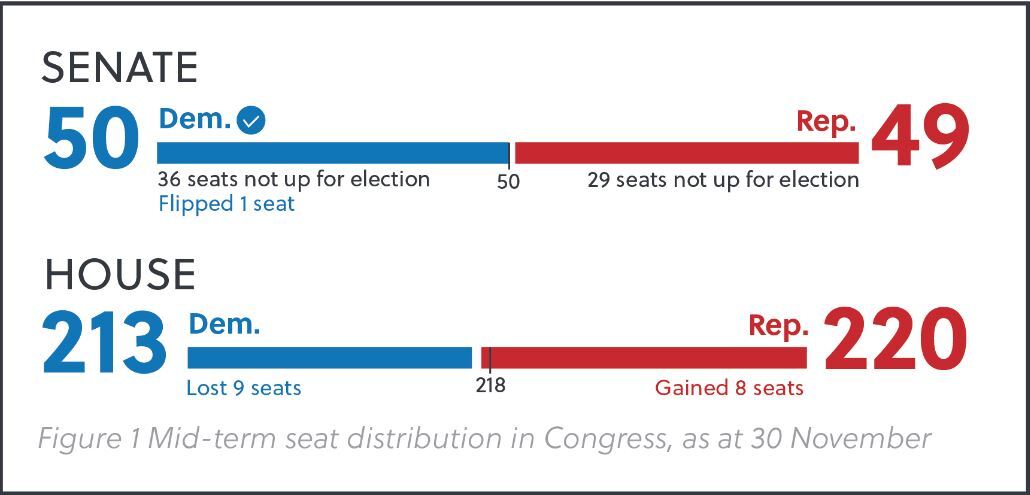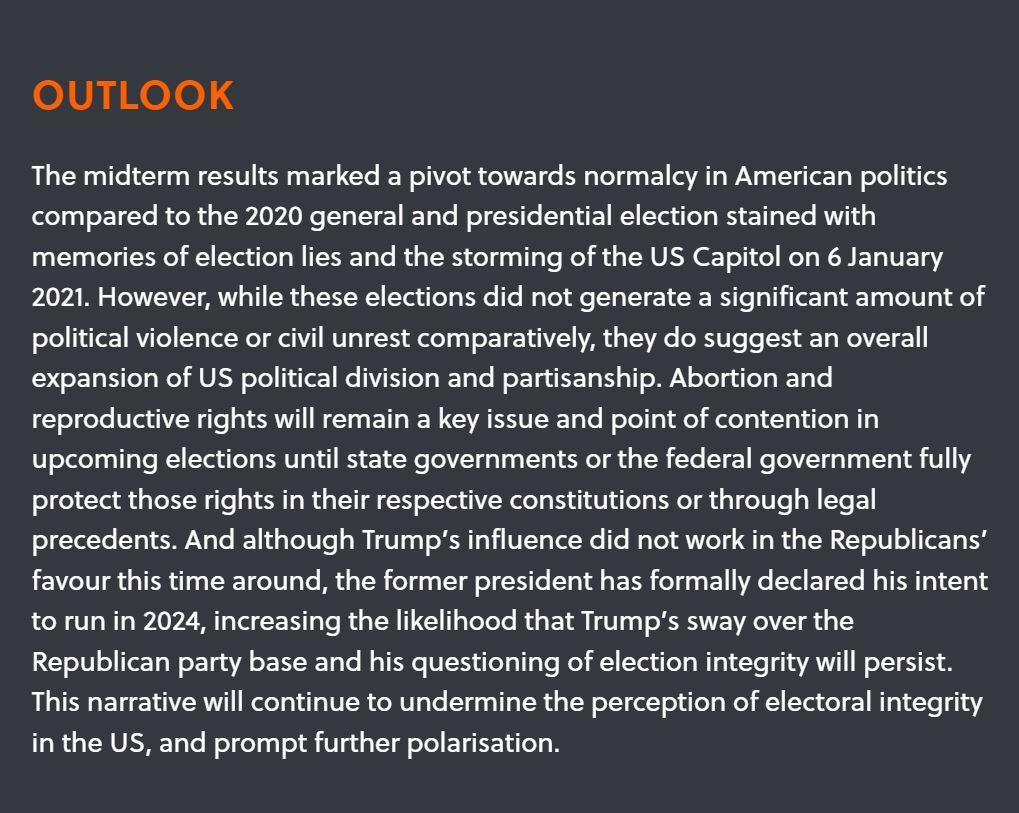Morning in America: A Return to Normalcy Post-US Midterm Elections
In the US, midterm elections typically serve as a report card on voters’ point of view on the sitting president and their political party. However, after stark memories of the tumultuous 2020 presidential campaign that included unfounded claims of a stolen election and the storming of the US Capitol building, as well as the question of reproductive rights and abortion on the line following the overturning of Roe vs Wade, the 2022 midterms proved to hold a higher significance as they acted as a referendum on the influence of Donald Trump and his election myths, as well testing the overall strength and stability of US democratic norms.
ELECTION RESULTS
While pre-election polls suggested that the Republican party was in line to win a majority in both chambers of the US Congress, especially in the US House of Representatives, the Democrats defied the odds and maintained their control of the Senate by winning 50 seats (the final seat for Georgia will be decided in a run-off in September; in a tied Senate, the vice-president casts the deciding vote). While the Republicans have secured a majority in the House – though some of the results are still to be confirmed – they will only hold a slim majority as the Democrats were able to render the broadly punted red wave into a ripple. Additionally, Trump-backed candidates echoing claims of a “stolen” 2020 election – presumable in the hope of gathering Trump-leaning voters – failed to gain swift or sweeping victories. For example, Dr Mehmet Oz, the former TV doctor who received support from the former president, lost his bid for US senator for Pennsylvania against Democrat John Fetterman, flipping a senate seat in favour of the Democrats. Abortion also proved to be on voters’ minds after the 24 June 2022 overturning of Roe vs Wade, the 1973 US Supreme Court landmark decision that affirmed the constitutional right to abortion. Voters in Michigan, California, and Vermont voted in favour of codifying the right to abortion in their respective states’ constitutions.

WHAT HAPPENED?
Despite polls suggesting a larger shift in power in favour of the Republicans, issues such as Trump’s influence in politics as well as abortion and reproductive rights helped maintain Democrats’ control of the Senate while lessening the Republican’s grip of the House. While Trump was not on the ballot, Republican candidates that Trump endorsed were running for seats in district and state-wide elections. This, according to Hans Hassell, an associate professor of political science at Florida State University, hurt Republican’s chances in competitive races. After researching the effects of Trump’s endorsements in the 2018 midterm elections, Hansell found that Trump’s endorsements mobilised the opposition, resulting in more fundraising for the Democratic candidate and higher voter turnout in favour of the opposition’s party. Therefore, with a push for fundraising against the Republicans and a record high voter turnout for Democrats, it is no surprise that the midterms resulted in losses for Trump-backed Republican candidates.
Abortion was also a huge motivator for voters, particularly for Democrats. According to exit polls conducted by Edison Research, six out of 10 voters said they were “dissatisfied or angry” with the overturning of Roe, and three out of 10 indicated that abortion was their top voting concern. The issue of abortion was split among party lines with 76 percent of Democrats claiming it was their top voting concern compared to only 23 percent of Republicans. Thus, with the question of reproductive rights on the ballot energising the Democratic base, a high turnout of Democrats was able stave off a Republican sweep of the House as well as maintain the Democrats’ hold of the Senate. The US economy struggling with battling inflation caused by Covid-19 pandemic setbacks and the ongoing war in Ukraine was also a consideration for voters, with three out of 10 voters claiming inflation and the economy were their top voting concern. However, the issue of inflation was split along party lines, with 72 percent of Republican voters claiming it was the most important issue when casting their ballots against only 27 percent of Democrats, suggesting that the pro-Democrat results were more influenced by abortion rights than the economy.

